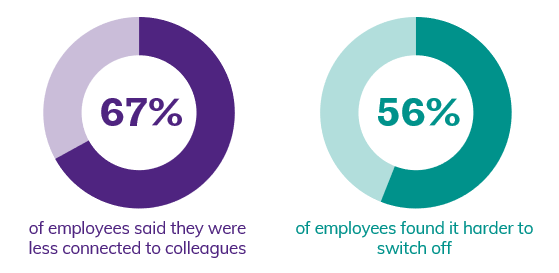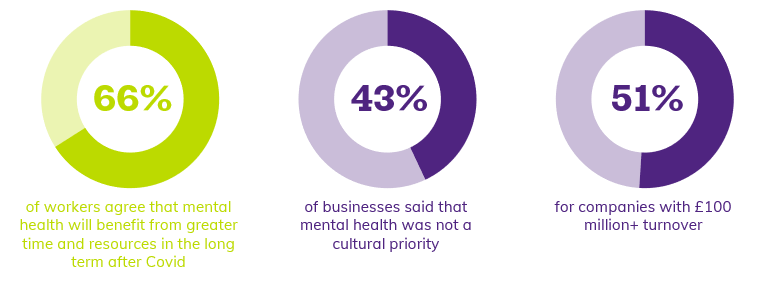The impact of the pandemic has been significant. While vaccine levels increase, the UK may be still be some way from a return to the office, especially with UK government advisers Sage recommending delaying a return to the office. All this is having an impact on the wellbeing of employees.
With companies scheduling Zoom-free Fridays, giving additional days off to their employees and the Irish government implementing guidance about a right to disconnect, some businesses are adapting their approach to help keep their most valuable asset – their people – happy and healthy. But that approach isn’t as widespread as it could be.
In a recent survey, 65% of UK workers said the pandemic had been damaging to their mental health. The situation is similar in Hong Kong (63%), Italy (62%) and Spain (61%) – and even in Germany, the country which said they were least affected, the figure was 44%.
It’s unsurprising that the biggest health crisis of a lifetime is causing worries. But it’s not only the pandemic that is having an effect. The impact of home working, despite many positives, is also taking its toll. 35% of office workers said their mental health had degraded since working from home.
It’s not only loss of contact with colleagues. In the middle of 2020, research showed that lockdowns have also had an impact. While 36% of people said they were experiencing loneliness due to reduced contact with colleagues, 45% of people said this was affected by reduced contact with family and friends. And the impact is not equally felt: young people and women were more likely to be impacted. This not only impacts employee’s wellbeing but also has been shown to have an impact on productivity too.
And newer research shows the same: The Royal Society for Public Health found that employees said they were less connected to colleagues (67%) and found it harder to switch off (56%).

The picture here is more mixed, with some companies stepping up with initiatives to support their employees and some continuing as normal. Those enterprise companies taking steps include:
 |
Gave employees an extra day off for wellbeing |
|
|
Offers a number of services, including a mental health help app, an advocates network to provide support and flexible working options, including an early finish on Fridays |
|
|
Has a free global benefits program to help employees and their families strengthen their psychological and emotional health |
|
|
Now include mental wellbeing questions in their employee engagement surveys and build wellbeing into leadership culture |
|
|
Offers days off for birthdays and also “peternity” leave for employees who get a new dog, cat or horse, so they can be home to help the animal settle in |
|
|
Sick days are offered as mental health time, provides virtual counselling sessions for stress and an anxiety workshop by Magellan |
But this isn’t the case across the board. In a recent survey, only 34% of employees said that their employer had offered support with their mental health, despite an increase in demand.
In addition, there is a disconnect between what employees think about mental health priorities and how businesses are responding to the crisis. While 81% of businesses say the pandemic has made them focus on workplace wellbeing, for the long-term employees expectations are not aligned with business objectives.

Sources: Courses Online, Koa Health
There is clearly more to be done.
HR teams have always had a key role in supporting staff. Data shows that during the pandemic, on average they are spending 30% more time on mental health support.
However, research also shows a disconnect between HR’s perceptions of how teams are coping and their own self-assessment. In a recent survey, 35% of employees said their team’s mental and physical wellbeing was “not good”, HR teams put this figure at 7%.
HR teams are an essential voice within the business to influence senior leaders and ensure that mental health initiatives aren’t just a perk, but a core way that employers are supporting their teams. Stepping up in this way makes a huge difference to the culture and to employer brand, which can impact retention and attraction levels. Research shows that compassion increases employee performance too, so businesses benefit from this approach.
© Talent Insight Group 2025